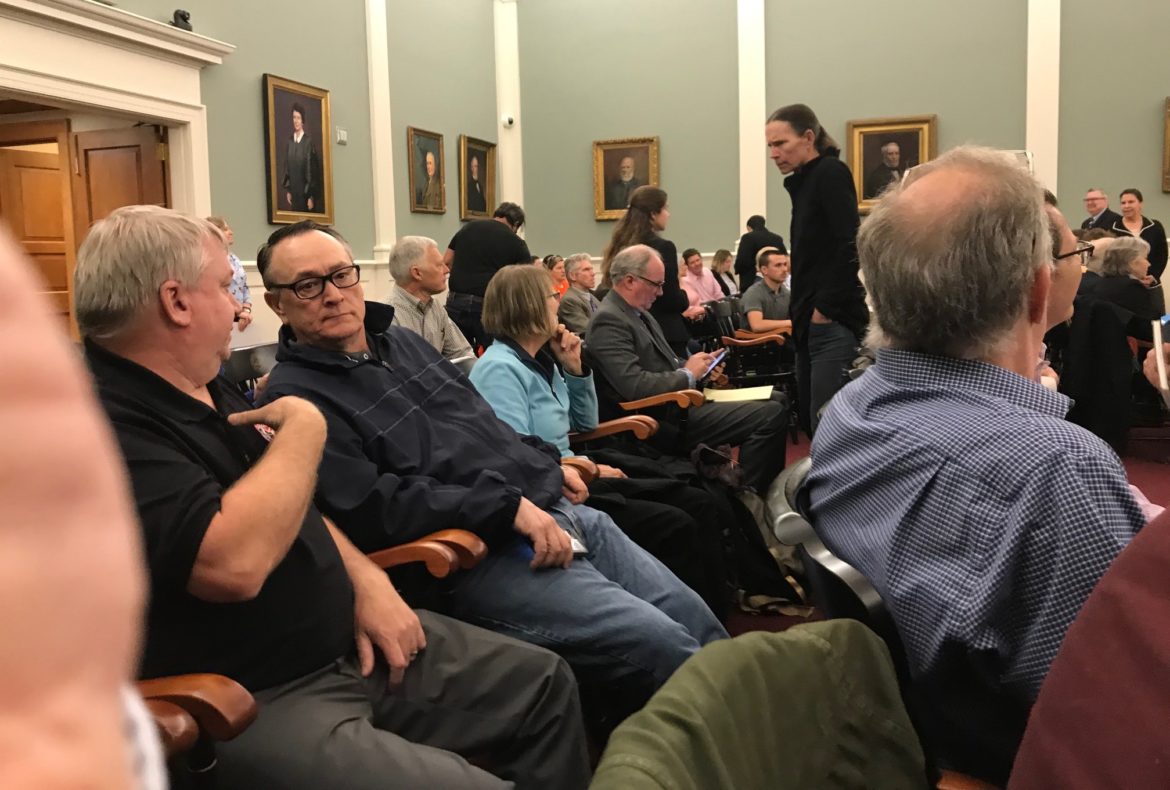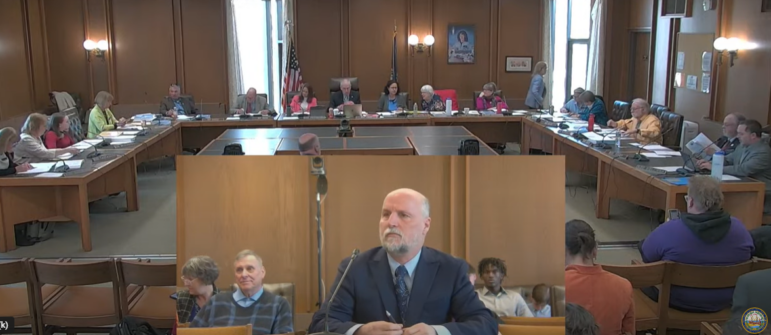Click Northern Pass archives here.
By GARRY RAYNO, InDepthNH.org
CONCORD — In a detailed, unanimous, 31-page decision Friday, the state Supreme Court affirmed the Site Evaluation Committee’s rejection of the Northern Pass Transmission Project.
“We have reviewed the record and conclude that the Subcommittee’s findings are supported by competent evidence and are not erroneous as a matter of law” Associate Justice Anna Barbara Hantz Marconi wrote for the court.
“Accordingly, we hold that the petitioners have not sustained their burden on appeal to show that the Subcommittee’s order was unreasonable or unlawful.”
The decision, which came two months after oral arguments, ends this chapter of the $1.6 billion, 1,090 megawatt, high-voltage transmission line project proposed by Eversource to bring Hydro-Quebec power to southern New England.
The decision disappointed Eversource who reiterated the region’s need for renewable energy, but was cheered by those who fought the project for nearly a decade claiming it would permanently scar the state’s majestic landscape.
“We are deeply disappointed that the New Hampshire Supreme Court reached this decision, but we are grateful for their consideration and deliberation in this case,” Eversource said in a statement. “We will closely review the Supreme Court’s decision and evaluate all potential options for moving forward.”
The Society for the Protection of New Hampshire Forests, one of the state’s largest conservation groups, said in a statement the decision ends nine years of efforts by thousands of Granite Staters to prevent the degradation of the state’s landscape.
“This legal victory is a win for everyone in New Hampshire and beyond that treasures New Hampshire’s superior landscape and outdoor recreation,” said Forest Society attorney Amy Manzelli.
Background
The Site Evaluation Committee voted 7-0 on Feb. 1, 2018, to deny Eversource’s application saying the company failed to meet its burden of proof the project would not unduly interfere with the orderly development of the region, one of the four criteria required to receive a permit to build.
The committee said Eversource and its experts failed to provide sufficient and credible evidence for the committee to make an informed decision on the project’s impact on property values, local businesses, tourism and changes in land use.
The committee reaffirmed its decision on the same 7-0 vote in May 2018 after Eversource asked the SEC to reconsider. After that decision, Northern Pass filed its appeal to the Supreme Court.
In filing its appeal, Eversource claimed the SEC statutes and rules on orderly development are vague and open ended allowing arbitrary decisions and the SEC failed to clarify or offer guidance on the standards; that the SEC should have continued to deliberate the case instead of stopping once it found the project failed one of the four criteria, and because it stopped deliberations, regulators failed to consider key components which would have addressed the issues raised in the SEC’s ruling; and the committee failed to follow statutes and its own rules.
Court sides with SEC
However, the five Supreme Court justices disagreed with the claims and did not address several of the issues raised by Eversource: whether the committee should have continued deliberating after finding the project failed to meet one of the four criteria and whether the statutes and regulations are unconstitutionally vague.
The five justices did find “the Subcommittee considered and weighed extensive evidence including testimony from 154 witnesses and over 2,000 exhibits presented by the parties, including 160 intervenors, conducted seven site visits, and held 70 days of adjudicative hearings.”
And the justices noted the court’s review was to determine if “the findings are supported by competent evidence in the record and are not erroneous as a matter of law. In doing so, we defer to the Subcommittee’s resolution of conflicts in the testimony and its determination of the credibility of witnesses and the weight to be given evidence.”
Careful consideration
In the ruling, the Supreme Court reviews the requirements and standards project developers need to meet in order to win approval including the impacts from construction and employment, and on the state’s economy, property values, tourism and regional and municipal land use regulations.
The court decision also addressed in detail, the developer’s claims on appeal including consideration of all relevant information, mitigation and conditions, weighing benefits and project impacts, and improper ad hoc decision making. The court found the SEC adequately addressed those issues, often siding with regulators’ claims that the developer did not provide sufficient evidence or credible witnesses to make its case and reach the burden of proof bar.
“Our review of the record shows that the Subcommittee made detailed findings regarding the credibility of the witnesses and the sufficiency of the evidence, consistent with the criteria the petitioners had notice they were required to meet,” the court said in Friday’s decision.
In several instances, the court notes the developer improperly tries to shift the burden of proof to the SEC such as developing mitigation and conditions to alleviate undue impacts.
“To require the Subcommittee to craft its own mitigating measures in order to make up for an applicant’s failure to satisfy the statutory and regulatory criteria would shift the burden of proof to the Subcommittee, in contravention of the plain language of the regulations,” the court wrote.
Moving forward
Eversource has said it may consider reapplying for another transmission project to address the region’s need for clean energy and reiterated that Friday.
“It’s clear that the need for new energy sources in New England is greater than ever, and we remain focused on innovative solutions that will lower costs for our customers, improve reliability and advance clean energy,” the company said in a statement.
“As we engage with local communities, residents, businesses and other stakeholders across the state, we will do so with a focus on our shared interests – a cleaner, more affordable energy future that supports economic development while also protecting the natural, cultural and historic resources that make our state special,” Eversource said.
The only other major utility project turned down by the SEC, Antrim Wind, reapplied with changes to satisfy regulators and was eventually approved and is currently under construction.
But opponents of Northern Pass said it is time to move to better technology and not rely on outdated models.
“After nearly nine long years, we are thrilled to finally see this misconceived, poorly designed, outdated overhead transmission line proposal finally laid to rest,” said John Judge, President and CEO of the Appalachian Mountain Club.
“As the nation’s oldest conservation and recreation organization, we have opposed this project from the get-go because of its unwarranted and unnecessary impact on New Hampshire’s iconic natural resources and character.”
Gov. Chris Sununu, who backed the project and was critical of the SEC’s decision to deny the application, said Friday the focus now should be on other clean energy projects.
“The Court has made it clear – it is time to move on,” Sununu said in a statement. “There are still many clean energy projects that lower electric rates to explore and develop for New Hampshire and the rest of New England.”
History
The project was opposed by environmentalists and conservationists, small business owners, residents along the route, local municipal and planning officials and all but two of the host communities.
The project had the support of large businesses and business organizations, unions and economic development officials.
Northern Pass was originally selected to provide Massachusetts with 1,200 megawatts of Hydro-Quebec energy under that state’s clean power act, but when the SEC denied the project, Massachusetts officials turned to a proposed transmission line through Maine, which is now before that state’s utility and environmental regulators.
Garry Rayno may be reached at garry.rayno@yahoo.com.
New Hampshire Supreme Court order
Read Northern Pass appeal here: New Hampshire Supreme Court appeal





